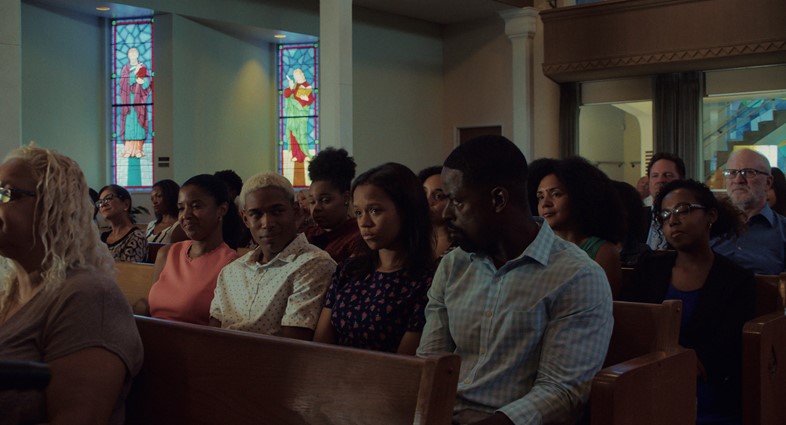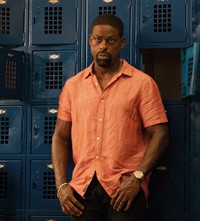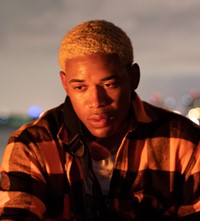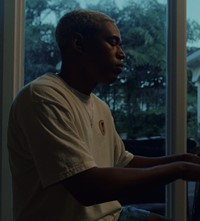Trey Edward Shults’ new drama deals with a dysfunctional family in the aftermath of trauma. Here, he speaks to Alex Denney about making the uniquely powerful film
- TextAlex Denney
For its first suffocating hour, Waves is the most nerve-racking time you’ll have in a cinema all year. A slow-motion panic attack disguised as an coming-of-age drama, Trey Edward Shults’ film plunges us into the world of Tyler Williams (Kelvin Harrison Jr.), a gifted high-school athlete from an affluent family in Florida. Slowly, the director turns the screw on his young protagonist by revealing the pressures heaped upon him – an overbearing dad, a career-threatening injury, a secret reliance on opioid painkillers. As an African-American man, his father reminds him, “the world doesn’t afford him the privilege of being average”. But Tyler’s obsessive desire to succeed comes with risks of its own, and cracks are beginning to show in his boy-most-likely facade.
Shults brings bravura and visual flair to this story of a family on the brink, his camera doing laps round his punch-drunk protagonist so we feel each dizzying high and devastating low. Then, having immersed us in Tyler’s world for well over an hour, he snaps us out of it, turning the lens on his sister, Emily (Taylor Russell), in a second act that serves as catharsis for the first. It was, the director acknowledges, a huge gamble: “We said the movie would live and die by who that performer was, because that’s gonna dictate whether you can go with it or not. It’s a huge amount of pressure for sure, but fortunately I think Taylor is incredible.”
It’s not the only tightrope Shults walked with the film. On the one hand, Waves is a deeply personal story for the director, a former high-school wrestler who suffered the same injury Tyler does in the movie (“It’s killing me today,” he says over coffee in Soho – blame the freezing wet of an English winter’s day, perhaps.) But it’s also a film about black pain told by a white filmmaker, arriving at a moment fraught with questions about who gets to tell what kinds of stories on screen, especially on the subject of race and culture.
To that end, Shults worked hard to ensure that Waves was a true collaboration with members of the cast – especially Harrison Jr., who starred in his last project, It Comes at Night. “For me it was all about collaboration,” says the director. “Kelvin and I loved each other and wanted to work together again, and this was the only idea I had. So I started trying to write in [things] we were talking about, you know? It was about me trying to understand Kel’s experiences – dynamics within his family, pressures, commonalities in our relationships, differences – and then trying to translate that. He would give me notes on the script and I’d go back and say, ‘Is this feeling more authentic?’ You can’t reach anything universal if it’s not specific.”
A crime committed by a character in the film underlined the delicacy of the story Shults was trying to tell; Sterling K. Brown, who plays patriarch Ronald, nearly passed on the part altogether, worried it would reinforce the ‘angry black man’ cliche that runs wild in American culture. “That was the first conversation I had with Sterling,” says Shults. “What makes [our film] different is we’re trying to understand and not judge; we’re trying to understand how this person gets to this space. Because if you don’t do that right, you’re just perpetuating a cliche and the whole movie’s failed.”

Ronald is a domineering presence in the film, a master of what Paddington would call “the hard stare” who retains a sympathetic edge in large part thanks to Brown’s soulful performance (Shults says he sees elements of his own dad and stepfather in the character, as well as Harrison Jr.’s). “I don’t push you because I want to, I push you because I have to,” Ronald tells Tyler during the film’s first half, a moment of quiet before the gathering storm. It’s both a classic pushy-parent line and an acknowledgement of the pressure many African-Americans feel to live up to an ideal of ‘black excellence’, an aspirational term rooted, perhaps, in a belief that American society’s prejudice can be overcome through sheer force of will and a determined work ethic.
As for Harrison Jr., who explored the theme before in last year’s child refugee drama Luce, Shults says the actor felt frustrated with the parts he was being offered, which either cast him as “a sinner or a saint, and not the complex human being in the middle”. Like his idol, Kanye, whose posters adorn his bedroom wall, Tyler is a “man at war with himself”, fighting to stay afloat in a sea of expectation. The challenge, says Shults, “was trying to make something honest to what Tyler feels (in the first half), whether it’s terror or anxiety or hurt. It was about how we could amplify that with the filmmaking as much as possible, to feel true to what he’s feeling.”
Shults employs a range of tricks to put us inside Tyler’s headspace. Imagine Terrence Malick directing a feature-length episode of Euphoria, and you’re some of the way towards imagining the transcendently angsty style being attempted here, from the psychedelic red, white and blue of the colour scheme to the pulsating mixtape soundtrack, featuring Kanye, Kendrick and Tame Impala. (Euphoria’s Alexa Demie plays a small but pivotal role as Tyler’s girlfriend.)
But then the unthinkable happens, and Tyler’s story makes way for Emily’s. The film’s second half follows Tyler’s sister as she attempts to overcome her trauma, gaining new perspective on love and family through a guy she meets at university. Newcomer Taylor Russell handles the role with quiet sensitivity, despite the lack of screentime she enjoys in the film’s first hour. But writing her character in more of Tyler’s section of the story would have been besides the point, says Shults: “It would have gone against the fibre of what I was trying to do. I wanted it so this girl [who’s been] off in the shadows becomes the heartbeat and soul of the movie. We knew some people wouldn’t go with that and others might love it, so you’re making it for the few that are gonna love it. It was about not being scared and doubling down on all of that.”
Though we see very little of Tyler in Waves’ second half, his presence is felt in other ways. Shults wrote his script with the mixtape tracks already in place, using them to “dictate the ebb and flow of the story while bringing you closer to the characters”. That proved something of a headache when Trent Reznor and Atticus Ross came on board to write the score (“I was terrified because I thought they’d be like, ‘Where the hell do we fit in?’” says Shults) but luckily, they hit upon a solution that weaved the separate threads of the story together, using “themes and a connecting melody that brings together the yin and yang, the two spirits that are shared between brother and sister”.
In the end, Waves is a film of two halves in more ways than one, from the two-act structure to its ambitious intertwining of the personal and political, which was always going to be a bridge too far for some. “I know this is hard for people, but even though the story is about a black family this is a deeply, deeply personal movie for me, so it’s kind of a beautiful fusion,” says Shults. “I’m a white filmmaker but I’m doing this film with someone I love, and there’s a trust and connection that’s already been built. I don’t know any way this movie could have been without that, because that’s what made it feel right. Everything grew from there.”
Waves is in UK cinemas from January 17, 2020.















